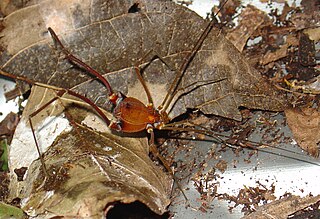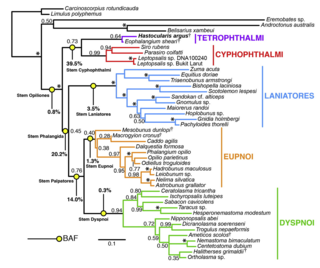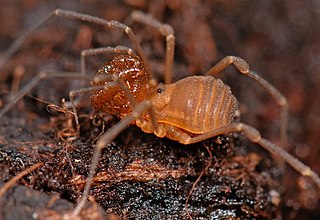
The Opiliones are an order of arachnids colloquially known as harvestmen, harvesters, harvest spiders, or daddy longlegs. As of April 2017, over 6,650 species of harvestmen have been discovered worldwide, although the total number of extant species may exceed 10,000. The order Opiliones includes five suborders: Cyphophthalmi, Eupnoi, Dyspnoi, Laniatores, and Tetrophthalmi, which were named in 2014.

A carapace is a dorsal (upper) section of the exoskeleton or shell in a number of animal groups, including arthropods, such as crustaceans and arachnids, as well as vertebrates, such as turtles and tortoises. In turtles and tortoises, the underside is called the plastron.

Laniatores is the largest suborder of the arachnid order Opiliones with over 4,000 described species worldwide. The majority of the species are highly dependent on humid environments and usually correlated with tropical and temperate forest habitats.

Gonyleptidae is a neotropical family of harvestmen with more than 800 species, the largest in the suborder Laniatores and the second largest of the Opiliones as a whole. The largest known harvestmen are gonyleptids.

The Grassatores are the most diverse infraorder of the Laniatores. It includes over 3,500 species distributed mainly in the tropics They are characterized by the male genitalia without musculature, operated by hydraulic pressure and by the double tarsal claws of posterior legs.

Cosmetidae is a family of harvestmen in the suborder Laniatores. With over 700 species, it is one of the largest families in Opiliones. They are endemic of the New World with a Nearctic-Neotropical distribution where a large fraction of the diversity of Opiliones are represented by this single family. Cosmetidae have the northern extent of their range into the USA, where a small number species occur in the southern states. However, the family is especially diverse in Mexico, Central America and northern South America; especially the Andean realms. Their range also extends further south into Argentina and southern Brazil, but they are absent in Chile. Cosmetidae are prevalent in Amazonian region, but only relatively few also occur in Brazilian Atlantic Forest. Several species are also found in the Caribbean.

Dyspnoi is a suborder of harvestmen, currently comprising 43 extant genera and 356 extant species, although more species are expected to be described in the future. The eight families are currently grouped into three superfamilies: the Acropsopilionoidea, Ischyropsalidioidea, and Troguloidea.

Cyphophthalmi is a suborder of harvestmen, colloquially known as mite harvestmen. Cyphophthalmi comprises 36 genera, and more than two hundred described species. The six families are currently grouped into three infraorders: the Boreophthalmi, Scopulophthalmi, and Sternophthalmi.

Troglosironidae is a family of harvestmen with seventeen described species in a single genus, Troglosiro, which is found on the island of New Caledonia, in the Pacific Ocean.

The Neogoveidae are a family of harvestmen with 27 described species in eight genera. However, eight species of Huitaca, 17 species of Metagovea and 12 species of Neogovea are currently awaiting description.

Ischyropsalididae is a family of harvestmen with 35 described species in 3 genera, found in Europe and North America.
The Zalmoxidae are a family of harvestmen within the suborder Laniatores.

The Cladonychiidae are a small family of harvestman with about 33 described species, within the suborder Laniatores.

Harvestmen (Opiliones) are an order of arachnids often confused with spiders, though the two orders are not closely related. Research on harvestman phylogeny is in a state of flux. While some families are clearly monophyletic, that is share a common ancestor, others are not, and the relationships between families are often not well understood.

Taracidae is a family of harvestmen in the order Opiliones. There are 4 genera and 23 described species in Taracidae.

Protolophidae is a family of harvestmen in the order Opiliones. There is at least one genus, Protolophus, and about six described species in Protolophidae found in Western North America.

Paranonychidae is a family of armoured harvestmen in the order Opiliones. There are about 6 genera and at least 20 described species in Paranonychidae.

Travunioidea is a superfamily of armoured harvestmen in the order Opiliones. There are 4 families and more than 70 described species in Travunioidea.

Cryptomastridae is a family of armoured harvestmen in the order Opiliones. There are two genera and four described species in Cryptomastridae, found in Oregon and Idaho.















